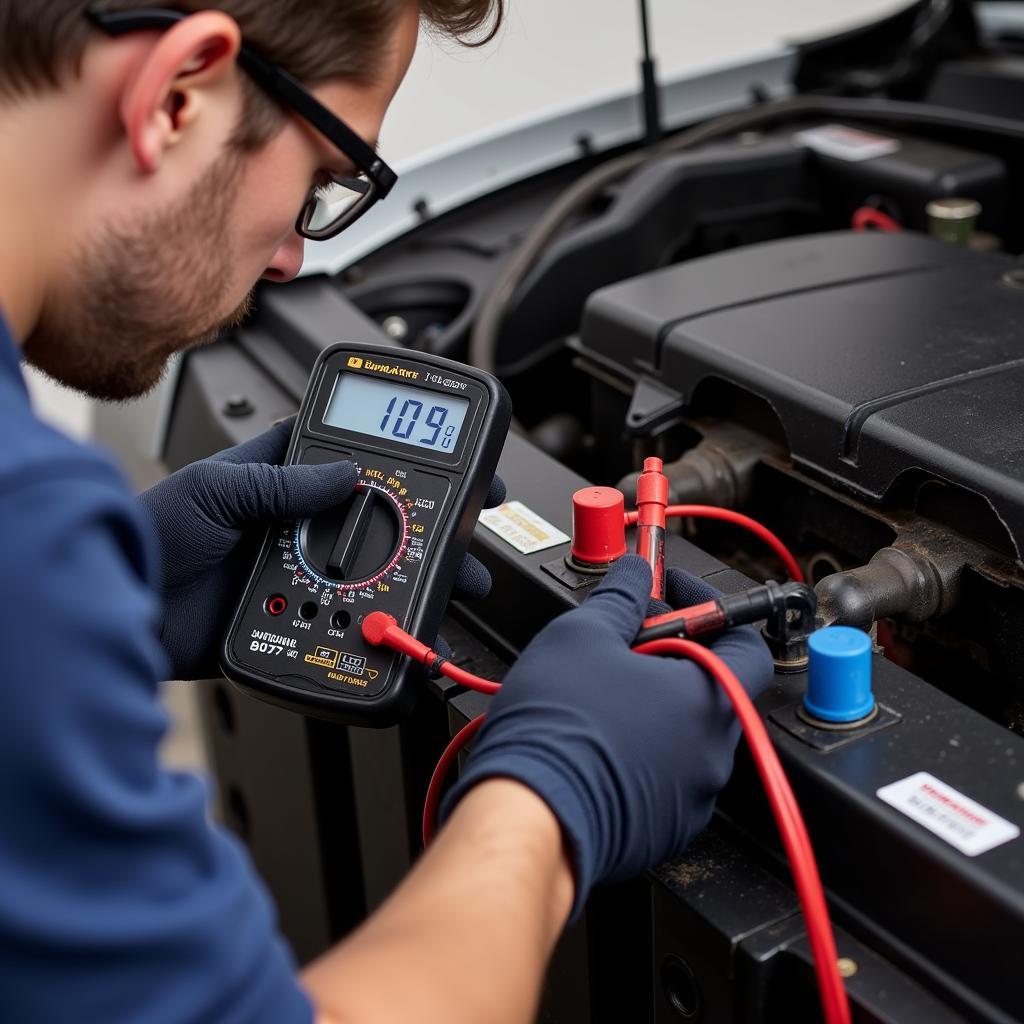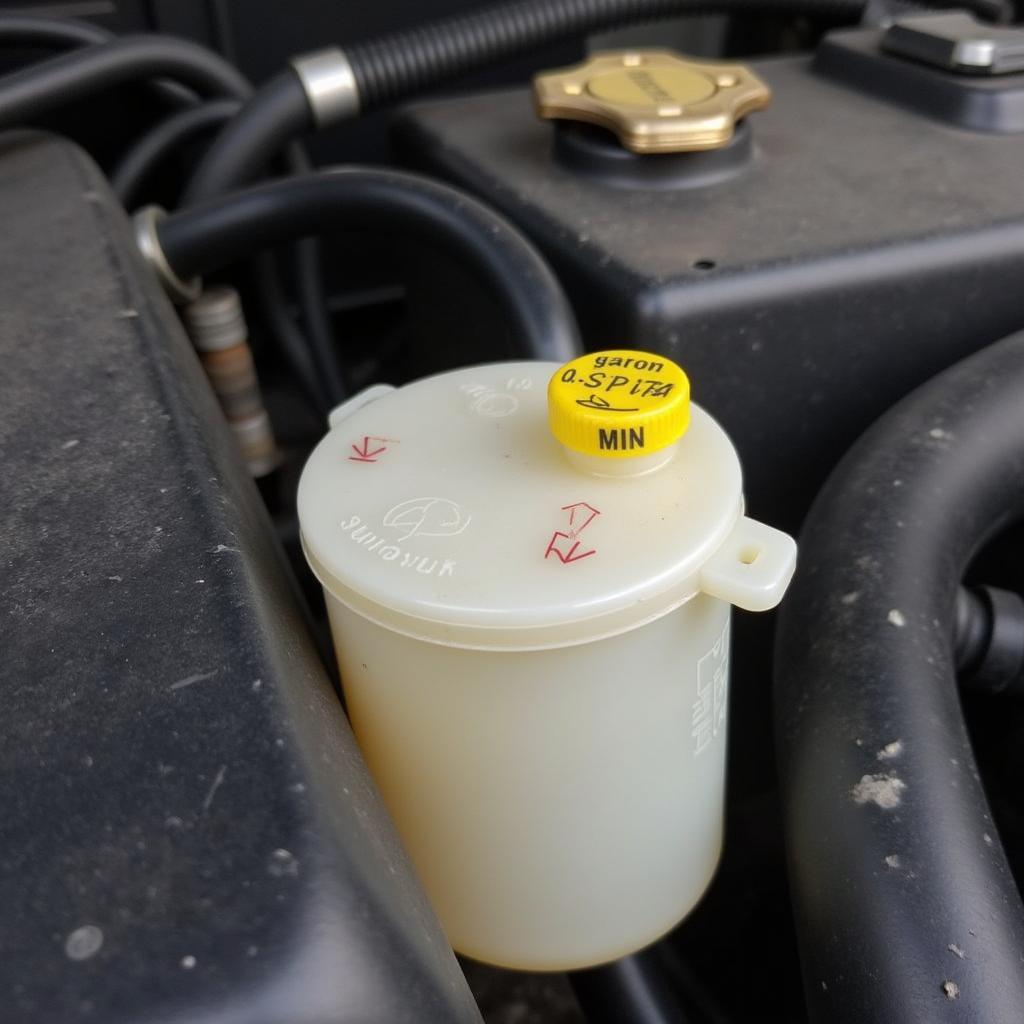A dead car battery can leave you stranded. Recognizing the signs you need a new car battery is crucial to avoid unexpected breakdowns. This article will explore the common indicators of a failing battery, empowering you to take proactive steps and keep your vehicle running smoothly.
Dim headlights are often one of the first signs you need a new car battery. If your headlights seem weaker than usual, especially when idling, your battery may be struggling to hold a charge. This can be particularly noticeable at night. Additionally, you might notice other electrical components, like interior lights and the radio, operating at reduced power. A weak battery affects the entire electrical system. This is important to address to ensure safe driving conditions. If you’ve noticed your 2018 Nissan Sentra brake malfunction warning light illuminating recently, it’s crucial to address it promptly, as it could indicate a potential issue with your braking system.
How to Tell if Your Car Battery is Dying
Several key indicators can help you determine if your battery is nearing the end of its life. Beyond dim headlights, pay attention to slow engine cranking. If your engine takes longer than usual to turn over, it’s a sign that the battery is struggling to provide the necessary power.
- Slow engine cranking
- Dim headlights
- Clicking sound when turning the key
- Electrical issues
- Battery age
Another common symptom is a clicking sound when you turn the key. This clicking often indicates that the battery doesn’t have enough power to engage the starter motor. If you experience this, it’s essential to have your battery tested. Don’t ignore these warning signs, as continuing to drive with a failing battery can lead to further complications. If you’re concerned about your Nissan Sentra brake warning light, it’s always best to consult a professional mechanic for a thorough diagnosis and repair.
Checking Your Car Battery
Regularly checking your car battery can help prevent unexpected issues. Inspect the battery terminals for corrosion. White, flaky buildup on the terminals can disrupt the flow of electricity. You can clean the terminals with a mixture of baking soda and water. Always disconnect the negative terminal first. It’s also wise to check the battery’s age. Most car batteries last between three and five years. If your battery is nearing this age, it’s a good idea to have it tested.
“A proactive approach to battery maintenance is essential for reliable vehicle operation,” says automotive expert, David Miller, ASE Certified Master Technician. “Regular inspections and timely replacements can save you from the frustration of a breakdown.”
 Checking Car Battery Voltage Using a Multimeter
Checking Car Battery Voltage Using a Multimeter
Other Signs of a Failing Battery
Beyond the obvious signs, other subtle indicators can suggest a failing battery. You might notice that your car needs to be jump-started frequently. This is a strong indication that your battery is unable to hold a charge. Additionally, a swollen or misshapen battery case is a serious warning sign and requires immediate attention. This can be caused by excessive heat and indicates internal damage. If your key fob battery is dead, you might experience difficulties locking or unlocking your car, and the keyless entry system might not function properly. Find out what happens when your key fob battery is dead to be prepared.
“Don’t underestimate the importance of a healthy car battery,” adds Sarah Johnson, Automotive Electrical Specialist. “It’s the heart of your vehicle’s electrical system and crucial for reliable performance.” A failing battery can lead to various issues, impacting not only the starting system but also other essential components. For instance, problems with your Nissan Sentra auto brake warning light could stem from a weak or dying battery.
Conclusion
Recognizing the signs you need a new car battery is essential to prevent unexpected breakdowns and ensure a smooth and reliable driving experience. From dim headlights to slow engine cranking, being aware of these indicators allows you to take proactive steps and replace your battery before it fails completely. Regular maintenance and periodic testing can extend your battery’s lifespan and minimize the risk of getting stranded. Don’t wait for your car to leave you on the side of the road – pay attention to these signs and keep your battery in top condition.
FAQ
- How long do car batteries typically last? Most car batteries have a lifespan of three to five years.
- Can I replace my car battery myself? Yes, with the proper tools and safety precautions, you can replace your car battery at home.
- How can I test my car battery’s voltage? You can use a multimeter to test the voltage. A healthy battery should read around 12.6 volts.
- What causes car batteries to fail? Several factors can contribute to battery failure, including age, extreme temperatures, and corrosion.
- How much does a new car battery cost? The cost of a new car battery varies depending on the type and brand, typically ranging from $50 to $200.
- What should I do if my car battery dies while driving? If your battery dies while driving, try to pull over to a safe location and call for roadside assistance.
- How can I prevent my car battery from dying prematurely? Regular maintenance, such as cleaning the terminals and avoiding short trips, can help extend your battery’s life.


